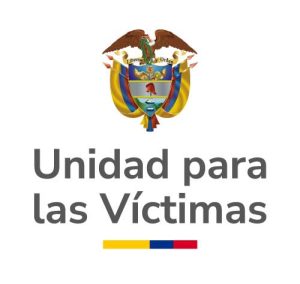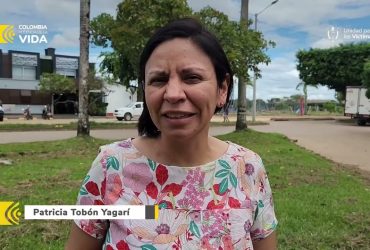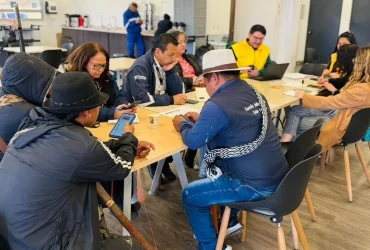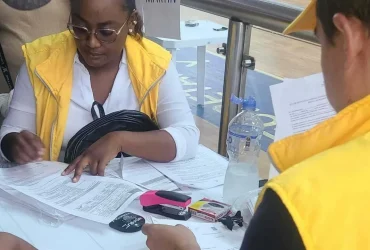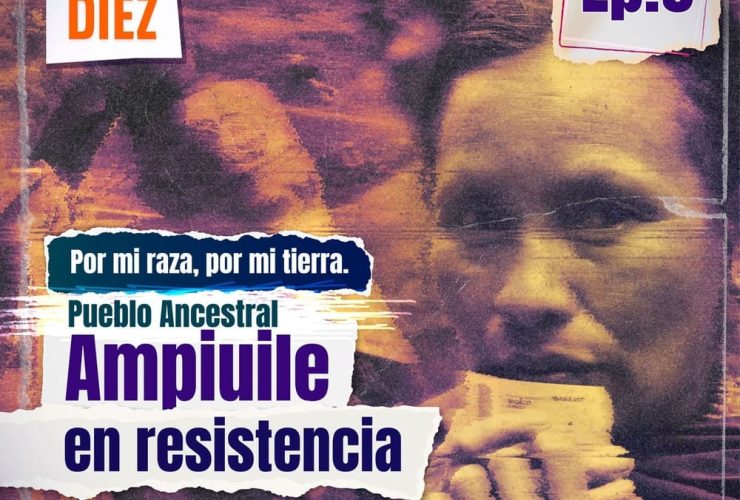By Erick González G.
2019, Friday, 6:30 p.m. m., the house of the massacre, 103 street with career 87, home of Digna Allín Gutierrez and her daughter Paola.
Pelaos, silence! Let’s start to see who gets the hot potato burned. Ready! The hot potato, the hot potato, the hot potato … burned!
The fun explodes, and around 45 children chant: “Poor thing, poor thing …” to an 8-year-old girl who kept the ball in her hands and must perform a penance: get up and perform an act in the middle of the room. With the grief of childhood decides to dance salsa. The poverty of Digna house does not allow to enjoy a sound equipment, not even of a modest speaker so that someone improvises like Dee jay; So with the spontaneity of childhood and that black skin proof of hardships and misfortunes, a group of youngsters imitates the Niche group; his palms, the key and their voices version Cali Pachanguero, Cali light of a new sky … carnival in La Chinita!
Thus, with a game, almost always 60 children open the curtain of Friday nights at home of Digna Allín Gutiérrez, is the prologue to the reading club that he created six months ago. “We started with 15 children and they told others, and that’s how the group grew,” says Digna, whose house was the epicenter of La Chinita massacre 25 years ago, a time when terror colonized Obrero neighborhood nights with the two or three nocturnal shots that were usually heard and that were synonymous with selective murders.
Sunday, January 23, 1994, 1:30 a. m., the street of the massacre, 103 street with carrera 87, La Chinita neighborhood
Rufina Gutiérrez Córdoba, mother of Digna, a Chocoana from the village of Samurindó, whose memory is not enough to tell her date of birth (Chocó) -because there was a mistake in her civil registry and her parents died when she was very small – Although she calculates it in 73 years, she was the one who was in need of organizing a party to collect funds to enroll her children in school and buy their school supplies.
“The father of my nine children did not answer for them, and although only five were in school, I had no money to enroll them, and even though a son had sent me 80,000 pesos, but I did not have any for the food either,” says Rufina.
With the 80,000 pesos they bought a part of the drinks for the festivity, they had to borrow the other part. At 7:00 p.m. m. they started the party. The tables and chairs crowded the street. Everything was happiness. Her daughter Digna served as a bar tender from the freezer of their house. The dance floor, of 7 meters by 14, located in a corner, was revived with the music that an improvised dj placed from the room of the house of Rufina, that now inhabits Digna and her daughter, Paola.
Around 1:30 in the morning, when Digna was at the door, dispensing the drink, one of her daughters came running from a corner and said:
- Mommy the cops are coming.
- Police? “she replied.
- Yes mommy, the police.
- “I stayed calm, even when I saw the people who were leaning back, I thought it was a married fight, but when I heard the ‘plumber’, I took my son and threw him inside; They knocked me to the ground when a bullet grazed my body, “remembers Digna.
- The irrationality of the bullets spread terror; They burned a motorcycle. In a flash, a lot of people packed into Rufina’s house to distribute anything that would serve as a shield. Suddenly the foolishness got even more.
- Light the houses, someone ordered.
But the women quenched that intention by arguing, between clemency and paroxysm, that there were many children inside the houses. They did not set fire, but the shooting continued and the bodies continued to fall. And as if he had a magnet that attracted them, they arrived at Rufina’s home.
“First, someone stopped at the door of the house, was masked. They entered the house, broke the beds and broke up the chiffonier. I did not know why they got here, although it was heard that the sector was threatened, “says Rufina.
All the victims of that massacre agree that a couple of years ago the domain of the region was shared by the Farc and the Epl, but when this last group decided to hand over their weapons and return to civilian life, the FARC declared war to them, and those who were most in danger were the reinserted ones that created the Esperanza, Paz y Libertad movement.
The threats to the neighborhood were due to the fact that the managers of the invasion of the lands on which La Chinita was built were the Sintrainagro union -the fusion of the former Sintrabanano unions, backed by the Farc, and Sintagro, supported by the Epl- and the nascent party. But in the festivity, of the 35 dead, apparently, only two belonged to Esperanza, Paz y Libertad movement.
“Although the order was not to kill women, they did kill one who was protecting her husband,” says Digna.
At five o’clock in the morning the Army arrived. Rufina’s family, feeling the military presence, became emboldened to open the door, but the terrible image of the street diluted any hint of illusion. There were so many dead that it looked like a cemetery. The canals built by the people were smeared with too much blood, that for lack of rain it stained the street for a long time, giving off a nauseous, sepulchral smell that reminded them of the fateful night.
The house of the hosts looked like a morgue, it was unlivable, the blood and the smell did not let it live.
“I felt guilty because if I had not had that party, so many people would not have died, but in spite of that the members of the board told me not to feel bad, that this was going to happen because they had announced it for a long time.”
For 15 days Rufina left with her young children for Madera; Digna left for Medellín. But the need forced their return because they had nowhere to stay. When they returned the neighborhood was just fear. But the worst thing was not to go back to the neighborhood, it was to live in that from that moment it was known as the house of the massacre.
“I used to work with a sewing machine. My older children helped me with money or food until things got back to normal. We did not have psychosocial support, because I had not been killed by any family member, I was not entitled to anything, but about eight years ago I declared as displaced, and they have already given me three grants in money, “says Rufina.
People had to start from zero and learn to exorcise fear. Caution became the eleventh commandment, since what they said could cost them their lives. If they witnessed a strange situation, silence was the most advisable. Terror caused people’s habits to be lost.
“Before the massacre we played greedy and struck. This neighborhood was a hybrid community and everyone came from different parts with their customs and traditions, “says Digna.
The house for more than two decades was uninhabitable, when it rained a lot, sewage sewage flooded it. Rufina went to live with a son, but Digna always remained there. Only until a year and a half ago they rebuilt the house.
“Someone told me to go to the Victims’ Unit to obtain a priority indemnity, help that is given when there are very vulnerable situations, and so I got my compensation,” said Digna.
The house of hope, a. m. And p. m.
After the massacre, the books helped Digna lose her fear and understand why people act in a certain way. In view of that benefit he decided to help others in the same way.
“When I started doing reading promotion with the demobilized people and their families, I knew the effect it could have on them, that they understood that reading is a way of understanding in what conditions we live and improve. That effect that the books generated in me is the one that I have started to impart to mothers who are heads of households, and I am sure that the books will help children to see things in a different way, “says Digna.
Any day a child can come to his residence and start reading a book without asking permission. Album books, by their images, are favorites. This adventure, not at all quixotic, after six months it seems that it could achieve greater achievements: other mothers have asked him to implement it in other sectors of Apartadó.
However, for this, he lacks resources to deliver teaching materials and snacks to the children who would attend the readings, as he does at home.
But Digna is not satisfied with what she is achieving, and with the idea of making teenagers reflect too, two months ago she began cinephors. “The last Friday of every month we present a movie. We put a white sheet on the front of the house and with a borrowed video beam we project a film that we have already seen and analyzed in order to make young people think and take them away from gangs, “says Paola, Digna’s daughter, who It is responsible for selecting the movie and downloading it.
When the film is presented, more than 100 children arrive, not counting the adolescents and mothers, so they need more than 100 snacks.
With this idea, Digna has already started the process to create her step by step foundation, which reflects the way they started with this project. Today her house is an open book, her reading club with 60 children has become a great story that he is writing with good results; extend to other sectors of Apartadó is the essay you want to address; In this way, her home, 25 years after the massacre, at the end of film and books, has become the house of hope, a true example of dignity, and the children of her reading club, as the song says of the Niche group, are “a whole town that inspires”.

